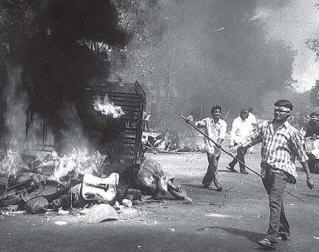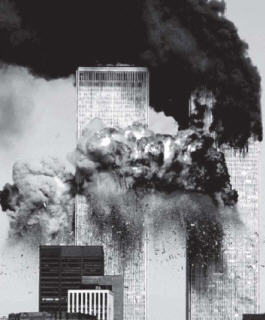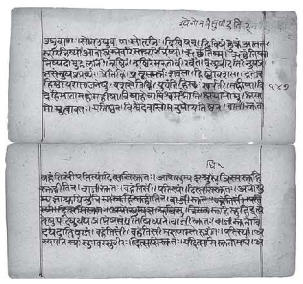The proposed act of burning the holy book is not an answer to violence
I’m ashamed to say it’s happening right in my own backyard. Pastor Terry Jones of the Dove World Outreach Center in Gainesville, Florida, has announced plans to burn the Islamic holy book, The Koran, on the ninth anniversary of the 11 September 2001 attacks. [This was later canceled. —Ed.] On its website, Voice of America (5 September 2010), states that “Religious leaders of all denominations have condemned the plan.” AOLNews.com (6 September 2010) says the plan, “has already set off angry protests from Afghanistan to Indonesia and elicited a formal response from the U.S. Embassy condemning the plan.” And, The Wall Street Journal reports (Asia News Section, 7 September 2010), “The top U.S. commander in Afghanistan said the planned burning…could put the lives of American troops in danger and damage the war effort.”
Face to Face

Sadly, I again find myself confronted by the all too familiar face of intolerance. My first glimpse of intolerance was during the 1950s from the backseat of our family car as we drove all day and night for two days through the South from Texas to Delaware. My father, although he was a U.S. Army officer, drove the entire way nonstop because, due to the color of his skin, he couldn’t find decent accommodations for his family.
My next encounter with intolerance was in the movie theater where I was introduced to Hindu/Muslim enmity. In the 1959 film ‘Flame Over India’ there was a particularly striking scene which showed a train on which all the passengers, Hindus and Europeans, had been killed by Muslims. There was no real explanation for the violence provided in the film, at least nothing that a ten-year-old could understand; just the graphic images of this intolerance remain fresh in my mind, and not without consequence.
When I took up my own spiritual path in the 1970s by joining the Hare Krsna Movement, I traveled to India and found a new face of intolerance. Popularly considered a Hindu in India, no longer did the color of my skin dictate intolerance, but Hindu/Muslim relations did. Touring the ancient temples in the holy places such as Vrndavana, the land of Lord Krsna, I saw how the beautifully intricate temple artwork meant to glorify Lord Krsna had been defaced by Muslims centuries ago. I heard stories of how the sacred deities of the Lord had to be secretly moved from one place to another to avoid desecration at the hands of Muslim rulers. Based on ‘Flame Over India’ and my personal experiences in India, I struggled against the human tendency to harbor enmity toward Muslims.
Later, back in Philadelphia where I was the temple leader, the face of intolerance turned ugly. Our Hare Krsna temple was the target of a twin bomb attack perpetrated during our early morning services. Fortunately, all the men, women, and children present were safe. Several months after the attack, the FBI confirmed that we were the target of Hindu/Sikh enmity stemming from political struggles between the two groups in India.
Overcoming intolerance

Yes, I’ve seen the ugly face of intolerance. Yet I remain committed to breaking the cycle of intolerance. Why? Because I know it will make me a better person. How to overcome the natural human response to return intolerance when faced with the intolerance of others? The only way is to realize our true spiritual nature and become godly.
In Sanskrit the word for godly is brahmana. The qualities of a brahmana are described in Bhagavad-gita, “Peacefulness, self-control, austerity, purity, tolerance, honesty, knowledge, wisdom and religiousness—these are the natural qualities by which the brahmanas work. These qualities are the mark of one who has realized their eternal nature as spirit soul, not this material body.”
Two of these qualities are particularly important to note as proving one’s spiritual being in virtually all religious traditions, tolerance and knowledge. Tolerance must be practiced. Yet, in order to be successful, tolerance must be more than simply self-restraint. Self-restraint alone will be tested and broken even in the best of men. However, if tolerance is rooted in knowledge, such a broad-minded individual can factually resist the urge to retaliate.
Such knowledge reveals the spiritual nature of all people and things as opposed to simply their outward or material form. Even the artifacts used in religious practice every day around the world such as printed scriptures can be understood to have these two forms. When addressing the subject of the Muslim desecration of Hindu temples, Srila Prabhupada said, “Just like in India we have experienced during British days. There were Hindu-Muslim riots. So the Hindus would go to the mosque of the Muslims and break it, and the Muslims would go the temples of the Hindus and break the idol. And they’ll think that “We have finished Hindu’s God.” Just like Hindus also think, “Oh, we have broken their mosque. Therefore I have broken their God.
“These are foolishness. In another case, when there was the noncooperation movement of Gandhi, the people became riotous, and they began to break anything government, especially the post boxes on the street. They thought by breaking the post boxes they are finishing the post office. So these are foolishness.”

Scriptures cannot be burned. Limited knowledge makes us think the printed pages alone are the scriptures, and that we can either burn the truth of the scriptures or protest the so-called desecration of the scriptures. Truth has its eternal form beyond material existence.
This is not to minimize the effect of acting in ignorance of the reality beyond material coverings, for we all have terrible experience of the tremendous consequences of acting without such knowledge, both in terms of terrorizing others in the name of religion, and now in protesting in the name of religion. Pastor Jones is perpetuating the cycle of intolerance by even presenting this idea of burning the material form of the Koran, let alone if he goes through with it. He is violating the trust given to him by his followers, and encouraging them to be lesser people. Therefore, the acts he proposes are rightly condemned. Through knowing the face of intolerance I have also come to know how to break the cycle of intolerance through knowledge, how to see the face of tolerance. My life experiences have taught me that broad-minded spiritualists will not be simply self-interested, but rather will actually broaden their souls through being the friend of all living beings, and seeking to do positive good for others. Tolerance has a much prettier face, even if it’s more difficult to see.
Sesa Dasa is a senior disciple of Srila Prabhupada
